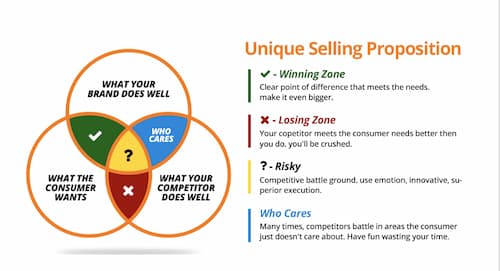Unique Selling point definition: A USP is one of the most powerful statements for a company. It not only helps you differentiate from a competitor, but creates an identity for yourself. In this article, we talk about the definition of USP, its importance and how to write one. Most of these concepts are explained from the perspective of a startup. However, I’d like to make a point that a startup is nothing but a larger company in its early stages.
Unique selling point definition
A unique selling point is defined as a differentiator for a company from the rest of the market. It sets you apart from the other competitors and help you explain what makes your product/service special. The most important point in the definition of a USP is that it gives a reason for someone to use your product.

The best way to describe a USP is – A statement that answers why someone should consider your product over someone else. For a startup, although unique selling point is yet to materialise, investors will expect your business plan to highlight it.
Unique Selling Point for a Small Business Vs Startup
A startup is essentially a large corporate in its early stages. Right from the initial days, a startup is focussed on scale and growth. (Read: What’s the difference between a startup and small business?) A small business however is focused on problem solving. Your business scale usually indicates how your USP can be defined.
While writing your USP for a small business, you compare with your immediate market. This is usually focussed on solutions immediately available. However, a unique selling point for a startup will be in comparison with large competitors in the market. (Read more: How to identify competition using Porter’s 5 forces)
Why is USP important?
Once we’ve understood the definition of USP, it is important to write it in a simple statement. You will notice that any business plan/pitch will demand you to write a good unique selling proposition. (Related: how to write a startup business plan?)Generally a USP is a single statement expressing how you’re different. This difference can be in your product uniqueness or your customer empathy. Although the definition of USP calls it a marketing statement, I’d argue that it is the way you do your business.
The USP is linked to your business vision and culture that has a long lasting impact. Calling it a marketing statement reduces its importance. Points below highlight why USP is important:
- It helps your customers understand why you’re special and worth the attention
- The USP indicates how you’re better suited than your competitors for the customer
- For a startup, it tells the investor why your business has the best potential to succeed against competition
How to write your USP?
Writing the USP is much harder than it sounds. A USP must be a simple, crisp statement – honest enough to build trust with the customer. You can’t mistreat it is a marketing/sales statement. The USP cannot be an opportunity to brag about features either.
Some tips about how to write your USP:
- Avoid the temptation to be feature oriented. A USP is about how you do business. The Unique selling point definition takes into account your solution and service instead of a product or feature alone.
- Make sure it is simple and easy to understand. Don’t expect the customer to speak your language. Your USP must be easy to understand and remember. It differentiates you from the rest of the competitors.
For an investor, your USP is an indicator as to why they should invest in you instead of other startups. While writing your USP
- Think about your customer and speak their language
- Understand which part of the user’s life you’re helping and speak about that
- Don’t list our your features
- A USP must be a single statement rather than a huge paragraph
USP and Market Segmentation
As a startup grows, the USP plays a pivotal role in your market segmentation. (What is market segmentation?). A market segmentation gives you a clear map of various products in your market and your potential position.

As you grow, you can explain why your perceived product value can be of either high/low price Vs the value as seen by the user. The USP explains why you deserve to point yourself in a particular segment. For a startup, the market segmentation can help you influence the pricing strategy. (Pricing strategy using market segmentation). It can guide you to create competitor based pricing strategy – again something that an investor would expect from your startup pitch.
Pingback: How to use Porter’s 5 forces in a startup - Inspire99
Pingback: 9 Key Areas of Business Model Canvas for an Entrepreneur - Inspire99
Pingback: Ansoff Matrix : 4 Key Areas to Understand Marketing Risks - Inspire99
Pingback: Focus on the importance of long-term relationships - Inspire99
Pingback: 5 Scalable startup entrepreneurship characteristics - Inspire99
Pingback: Scalable Startup Entrepreneurship definition - Inspire99
Pingback: Should your start go for Horizontal Vs Vertical Market? - Inspire99
Pingback: Selling is not a pushy act, it is about empathy - Inspire99
Pingback: Branding Hacks for E-Commerce - Inspire99
Pingback: Does Minimum Lovable Product for a Startup work? - Inspire99
Pingback: Do not focus on numbers, focus on what you do best - Inspire99
Pingback: 5 strategic steps for your startup branding - Inspire99
Pingback: How to know if your business idea is good and worth pursuing? - Inspire99
Pingback: Freemium Model Pros and Cons for a startup - Inspire99
Pingback: 6 Key steps to Startup Branding strategy - Inspire99